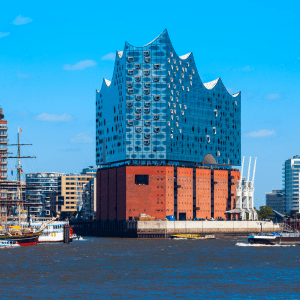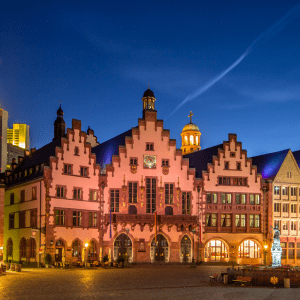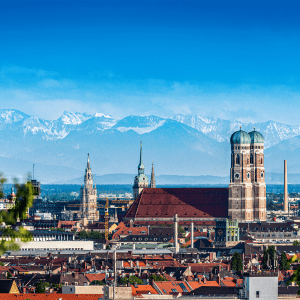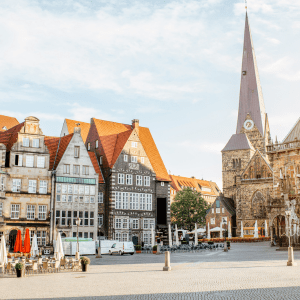# let's Grow Your Hand
Study in the Germany: Your Roadmap to Success!
Navigate Your Path to Success - Expert Guidance for Studying Abroad in the Land of Opportunities!
Why Study in Germany?
Germany consistently ranks high in global education indices, ensuring that students receive top-notch education and exposure to a multicultural society. The emphasis on innovation and technological advancement makes German institutions leaders in various fields.
Academic Excellence
Benefit from world-renowned universities and cutting-edge research, ensuring a top-tier education that opens doors globally.
Diverse Culture
Immerse yourself in a melting pot of cultures, ideas, and perspectives, fostering personal growth and a truly enriching experience.
Career Opportunities
Gain access to a dynamic job market with ample internship and post-graduation employment opportunities, setting the stage for a successful career.
Innovation Hub
Join a country at the forefront of innovation and technology, offering a stimulating environment for creativity and entrepreneurial pursuits.
Quality of Life
Experience a high standard of living, excellent healthcare, and a variety of recreational activities, making the Germany a well-rounded and desirable destination for international students.
The Transformative Benefits of Choosing to Study
Discover the world, expand your mind! Choose to study abroad for top-notch education, cultural immersion, and personal growth. Your journey to global success starts here!
Choose Your Desired Courses
Discover the world, expand your mind! Choose to study abroad for top-notch education, cultural immersion, and personal growth. Your journey to global success starts here!
Choose Your Interested Location in Germany
Discover academic excellence amidst stunning landscapes. Study in Germany for a vibrant cultural experience, renowned universities, and opportunities in tech and entertainment industries.



Berlin
- Phone:+1 (859) 254-6589
- Email:info@example.com



Hamburg
- Phone:+1 (859) 254-6589
- Email:info@example.com



Frankfurt
- Phone:+1 (859) 254-6589
- Email:info@example.com



Munich
- Phone:+1 (859) 254-6589
- Email:info@example.com



Cologne
- Phone:+1 (859) 254-6589
- Email:info@example.com



Bremen
- Phone:+1 (859) 254-6589
- Email:info@example.com



Essen
- Phone:+1 (859) 254-6589
- Email:info@example.com



Heidelberg
- Phone:+1 (859) 254-6589
- Email:info@example.com
Admission requirements for studying in Germany
Planning to study in the Germany? Let us help you get started with the basic admission requirements that you will need.
Preparing for Examinations
Pursuing a course in the Germany begins with competitive and rigorous exams such as GRE/GMAT for postgraduate studies and IELTS or TOEFL for English proficiency. Some programs do not require GRE/GMAT. Thorough preparation is vital as these exams significantly influence university admissions.
University Application Process
The application process involves submitting academic transcripts, letters of recommendation, a statement of purpose, and exam scores. Meeting application deadlines and following specific university guidelines are critical to success.
Figuring Out Your Finances
A full-time program in the US can cost up to ₹ 70Lacs. Planning your finances is essential, considering options like scholarships and loans, though the latter may come with high-interest rates.
Visa Process
Applying for a student visa entails presenting the necessary documentation, attending an interview, and paying a fee. It is advisable to start this process early to avoid delays.
Booking Your Travel
Early travel bookings are recommended, as costs can be high, especially during peak seasons. Consider budget airlines and travel packages to minimize expenses.
Finalizing Your Stay
The cost of accommodation varies based on location and preferences. Exploring housing options early allows for a more budget-friendly selection, whether choosing university housing or private rentals.
How You Can Manage expenses while studying in the Germany
Our programs offer financial aid and the chance to study in Germany at low cost. Here's how international students in Germany manage their living expenses while studying there.
Opting for hybrid programs, which combine online and in-person classes, can offer significant cost savings. These programs allow students to complete a portion of their coursework remotely, reducing expenses associated with accommodation, transportation, and on-campus living.
The flexibility of hybrid programs enables students to strike a balance between academic pursuits and managing their budget effectively.
Germany is home to numerous institutions and organizations that offer a wide range of scholarships for international students. These scholarships can cover tuition fees, living expenses, or a combination of both. It is crucial for students to research and apply for available scholarships well in advance.
Many academic institutions and governmental bodies provide financial aid based on merit, need, or specific criteria related to the student’s field of study. Applying for scholarships can significantly alleviate the financial strain of studying abroad.
Taking out student loans is a common method for funding education in Germany. Financial institutions, both in France and in the student’s home country, often provide loans specifically tailored for international students. Before opting for a loan, it is essential to thoroughly understand the terms and conditions, interest rates, and repayment plans.
Students should explore government-sponsored loan programs and private financial institutions to identify the most suitable loan options that align with their financial capacity.
Germany allows international students to work part-time during their studies. Engaging in part-time employment not only provides students with valuable work experience but also contributes to covering living expenses. Most students work in sectors such as retail, hospitality, or on-campus roles.
It is important, however, to strike a balance between work and academics, ensuring that employment commitments do not compromise the quality of education.


























Everything You Need To Know About Germany
Germany, a country located in the heart of Europe, is known for its rich history and cultural heritage. With a population of over 80 million people, it is the most populous country in the European Union. Germany shares its borders with nine other countries, including France, Austria, and Poland.
One of Germany's defining characteristics is its diverse landscape. From stunning mountain ranges like the Bavarian Alps to picturesque coastal regions along the North Sea and Baltic Sea, there are endless opportunities for outdoor enthusiasts to explore.
When it comes to culture and lifestyle, Germany has made significant contributions to art, music, literature, and philosophy throughout history. The country boasts numerous world-renowned composers such as Ludwig van Beethoven and Johann Sebastian Bach.
In terms of economy, Germany stands strong as one of the world's largest economies. It is renowned for its manufacturing prowess in industries such as automotive engineering (think Mercedes-Benz and BMW) and machinery production.
The government system in Germany operates under a federal parliamentary republic framework. It consists of multiple levels - national (federal), state (Länder), and local governments - each with their own responsibilities.
Germany also places great emphasis on education. Its education system offers high-quality schooling from primary level through university studies. Renowned universities like Heidelberg University attract students from around the globe who seek top-notch academic programs.
So whether you're fascinated by history or eager to experience modern innovation firsthand; whether you're drawn to breathtaking landscapes or crave an enriching cultural experience - Germany has something unique in store for everyone who visits this captivating country!
Germany has a rich and complex history that spans thousands of years. From the ancient tribes who inhabited the region to the rise and fall of various empires, Germany's past is filled with significant events and influential figures.
One of the earliest civilizations in Germany was that of the Celts, who settled in the region around 500 BC. They were later conquered by the Romans, who introduced their language and culture to the area.
In medieval times, Germany was home to numerous powerful kingdoms and city-states. The Holy Roman Empire, which existed from 962 until 1806, played a central role in shaping German history during this period.
The 19th century saw dramatic changes in Germany. It became a unified nation under Otto von Bismarck's leadership in 1871. This led to rapid industrialization and economic growth.
However, Germany also experienced two devastating world wars within a span of just a few decades - World War I (1914-1918) and World War II (1939-1945). These wars had far-reaching consequences for both Germany itself and the rest of the world.
After World War II, Germany was divided into East Germany (German Democratic Republic) and West Germany (Federal Republic of Germany), reflecting Cold War tensions between East and West blocs. In 1990, after years of division, East and West reunified into what we now know as modern-day Germany.
Throughout its history, German culture has been shaped by influential artists such as Beethoven Bach Mozart Goethe Schiller Nietzsche Hegel Kant Freud Einstein Marx Weber Adorno Horkheimer Habermas Gottfried Leibniz Heidegger Schopenhauer Brecht Rilke Mann Kafka Grass Klee Richter Baselitz Gerhard Richter Jürgen Klopp Angela Merkel Helmut Kohl Willy Brandt Konrad Adenauer Walter Gropius Mies van der Rohe Thomas Mann and many more. Today, Germany continues to be a key player on the world.
Germany has one of the largest and most powerful economies in the world. It is known for its strong manufacturing sector, especially in automobiles and machinery. The country is also a major exporter of goods, with exports accounting for a significant portion of its GDP.
The German economy is characterized by innovation and technological advancements. Many renowned companies have their headquarters in Germany, such as Volkswagen, BMW, Siemens, and BASF. These companies play a vital role in driving economic growth and creating job opportunities.
Germany's economic success can be attributed to its skilled workforce and high-quality education system. The country places great emphasis on vocational training programs that equip individuals with practical skills needed in various industries.
In recent years, Germany has also been at the forefront of renewable energy development. The government has implemented policies to promote clean energy sources like wind and solar power, leading to the growth of this industry.
Furthermore, Germany benefits from being part of the European Union (EU). This allows easy access to a large market for German businesses to trade with other member states without facing significant barriers.
Germany's robust economy serves as an example for other countries worldwide. Its focus on innovation, skilled labor force, export-oriented approach, and commitment towards sustainability make it a global leader economically.
Germany has a federal parliamentary republic form of government. It is a country that values democracy and upholds the principles of freedom, equality, and rule of law. The German government operates under a system known as the Basic Law or Grundgesetz, which outlines the rights and responsibilities of both citizens and government institutions.
The German political system consists of three branches: the executive, legislative, and judicial. The executive branch is headed by the Federal President who serves as the ceremonial head of state. The Chancellor holds significant power as the head of government.
The legislative branch is comprised of two chambers - the Bundestag (Federal Diet) and Bundesrat (Federal Council). Members are elected through a mixed-member proportional representation system. This ensures fair representation for smaller parties while maintaining stability with major parties.
The judicial branch includes various courts at different levels to ensure justice in accordance with established laws. Germany's legal system relies on civil law principles derived from Roman law traditions.
Furthermore, Germany actively participates in international organizations such as NATO, EU, UN, among others. Its foreign policy focuses on promoting peace, resolving conflicts diplomatically, supporting human rights globally while safeguarding its own national interests.
Germany's democratic governance provides stability and transparency for its citizens while fostering cooperation with other nations around the world.
Germany is the most populous country in the European Union, with a population of over 83 million people. The German population is diverse and multicultural, with citizens from various ethnic backgrounds.
The country has experienced significant changes in its population over the years. After World War II, Germany faced a period of rapid economic growth which led to an influx of immigrants from other countries. Today, about one-fifth of Germany's population consists of foreign-born individuals.
One interesting aspect of Germany's population is its aging demographic. Like many developed countries, Germany has a low birth rate and a high life expectancy. This trend has resulted in an increasing proportion of elderly individuals within the population.
In terms of urbanization, Germany has several major cities that are home to large populations. Berlin, the capital city, is known for its vibrant culture and attracts people from all walks of life. Other notable cities include Hamburg, Munich, Frankfurt, and Cologne.
Despite being highly populated in certain areas, Germany also boasts beautiful rural landscapes dotted with charming villages and towns. Many Germans choose to live outside major cities for a more peaceful lifestyle surrounded by nature.
The population dynamics in Germany continue to evolve as it adapts to social and economic changes both domestically and internationally.
Germany is a country that prides itself on its rich culture and diverse lifestyle. With a vibrant arts scene, historical landmarks, and festivals that celebrate its traditions, there is always something to explore in this culturally-rich nation.
German culture places great emphasis on efficiency, punctuality, and orderliness. It is not uncommon to find Germans meticulously planning their day-to-day activities and following strict schedules. This disciplined approach extends beyond personal lives into the workplace as well.
Germans have a deep appreciation for the arts, with numerous museums showcasing masterpieces from renowned artists such as Dürer and Beckmann. The country's love for music is evident through its world-famous composers like Bach, Beethoven, and Wagner.
When it comes to food, Germany offers a wide variety of hearty dishes that are known worldwide. From sausages like bratwurst and currywurst to pretzels and sauerkraut - German cuisine has something for every palate.
Sports also play an important role in German culture. Football (soccer) holds a special place in the hearts of many Germans who passionately support their local teams during matches.
Germans value nature greatly too; they cherish their beautiful landscapes by engaging in outdoor activities such as hiking or cycling. The country's commitment to sustainability can be seen through initiatives aimed at protecting the environment.
Germany boasts a unique blend of tradition while embracing modernity. Its cultural richness spans across various forms of art expression along with meticulous attention given to maintaining an organized lifestyle filled with warmth towards nature alongside technological advancements.
Germany, a country located in central Europe, boasts a diverse and captivating geography. From the stunning beauty of the Bavarian Alps to the picturesque shores of the Baltic Sea, Germany offers an array of landscapes for nature enthusiasts to explore.
In the southern region of Germany lies the majestic Black Forest, known for its dense forests, rolling hills, and charming villages. This enchanting area is perfect for hiking and immersing oneself in nature's tranquility.
Moving towards the north, we come across Germany's expansive plains. These fertile lands are ideal for agricultural activities and contribute significantly to Germany's economy. The vast fields stretch as far as the eye can see and create a sense of openness that contrasts with the mountainous regions.
One cannot talk about German geography without mentioning its numerous rivers. The mighty Rhine River cuts through western Germany, offering breathtaking views along its banks. Cities such as Cologne and Mainz thrive on their proximity to this vital waterway.
To experience coastal beauty, head towards northern Germany where you'll find sandy beaches lining both sides of Schleswig-Holstein peninsula. Whether you're seeking relaxation or thrilling water sports activities like windsurfing or sailing, this region has it all.
Let's not forget about Berlin – Germany's vibrant capital city situated in northeastern part of country! It embodies urban charm with its bustling streets and iconic landmarks like Brandenburg Gate.
Indeed, when it comes to geographical diversity, few countries can rival what Germany has to offer. From soaring mountains to lush plains and serene coastlines – there is something here for every adventurer at heart!
Climate plays a significant role in shaping the environment and lifestyle of any country. In the case of Germany, it experiences a temperate seasonal climate characterized by mild to moderate temperatures throughout the year.
The country is situated in central Europe, which means it benefits from a mixture of maritime and continental influences. These factors contribute to Germany's diverse climate patterns across different regions.
In general, the northern parts of Germany have cooler summers and milder winters compared to the southern regions. The coastal areas experience relatively mild temperatures due to proximity to bodies of water such as the North Sea and Baltic Sea.
Germany also gets its fair share of rainfall throughout the year, with higher precipitation levels in mountainous areas like Bavaria. However, this doesn't deter locals or tourists from exploring outdoor activities as there are numerous parks, forests, and lakes that add beauty to every season.
Whether you're visiting during summer or winter, Germany offers something for everyone. From enjoying outdoor festivals under sunny skies to skiing down snow-covered mountains – there's always an adventure waiting for you!
So pack your bags accordingly when planning your trip to Germany because weather conditions can vary significantly depending on where you go within this beautiful country. Just remember to check local weather forecasts before embarking on any outdoor excursions!
Germany has a renowned education system that is highly respected worldwide. Education in Germany is primarily the responsibility of individual states, resulting in some variations across the country. However, there are certain common features that can be found throughout the German education system.
The education system in Germany follows a three-tiered structure: primary school (Grundschule), secondary school (Gymnasium or Realschule), and tertiary education (Universität or Fachhochschule).
Primary school typically lasts for four years and focuses on basic subjects such as mathematics, German language, and social studies. Secondary school then offers different tracks based on students' academic abilities and interests.
The Gymnasium track prepares students for university entrance exams and offers a broad curriculum with an emphasis on academics. The Realschule track provides more vocational-oriented education, preparing students for technical careers or further vocational training.
After completing secondary education, students have the option to pursue higher education at universities or specialized institutions called Fachhochschulen. These institutions offer practical-oriented programs that prepare graduates for specific professions.
One unique aspect of the German higher education system is its emphasis on tuition-free or low-cost public universities. This accessibility attracts many international students seeking high-quality education without hefty fees.
Moreover, German universities are known for their research-driven approach to learning, providing ample opportunities for hands-on experience and collaboration with industry professionals.
To study in Germany as an international student, you usually need to obtain a student visa. The requirements may vary depending on your nationality but generally include proof of admission into a recognized institution and sufficient financial means to support yourself during your stay.
If you're considering studying in Germany, it's important to be aware of the visa requirements. As an international student, you will typically need a student visa to study in Germany. The process can seem overwhelming at first, but with the right information and guidance, obtaining a student visa for Germany is definitely achievable.
To apply for a student visa, you will generally need to provide proof of acceptance from a German university or educational institution. You'll also need to demonstrate that you have sufficient financial resources to cover your living expenses while studying in Germany. Additionally, health insurance coverage is mandatory for all students.
The specific requirements and application process may vary depending on your country of origin. It's advisable to contact the German embassy or consulate in your home country for detailed instructions and assistance with the application process.
Once you've obtained your student visa, it's important to keep track of its expiration date and ensure that you renew it if necessary. Also, remember that as an international student in Germany, there may be certain restrictions on working hours during your studies.
Pursuing higher education in Germany offers numerous advantages such as access to world-renowned universities and diverse academic programs. The country boasts a rich history and vibrant culture that attracts students from all over the world. With its strong economy and high quality of life, studying in Germany can open doors to exciting career opportunities both within the country and internationally.
let's Stand Together
Study in the Germany
Find programs that match your eligibility and aspirations then apply with reduced application fees, a free assessment and access to a dedicated advisor.
Latest News
Standards compliant e-business.Phosfluorescently expedite functional products via premium action
items wireless innovation compliant e-business.
Concerned About Expenses? Tips for Managing Your Budget While Studying Abroad
Are you dreaming of studying abroad, immersing yourself in a new culture, and gaining valuable life experiences? The allure of […]
Is Culture Shock Real? Navigating the Uncharted Territories of Studying Abroad
Hey there globetrotters and adventure seekers! Are you ready to embark on a journey that will broaden your horizons, challenge […]
Wondering Where to Begin? How to Choose the Perfect Study Abroad Destination
Are you feeling a little adventurous? Maybe a bit curious to explore the world beyond your campus walls? Well, studying […]
Frequently Asked Questions (FAQs)
Your Go-To Guide for a Smooth Journey to Graduate Success!
Germany is known for its world-class education, diverse academic programs, and numerous English-taught courses. Additionally, many universities have low or no tuition fees, providing an excellent education at an affordable cost.
While many programs are offered in English, some may require proficiency in German. Language requirements vary by university and program, so it’s essential to check the specific requirements for your chosen course.
To apply for a student visa, you’ll generally need an acceptance letter from a German university, proof of financial means, and health insurance. The application process may vary, so it’s advisable to contact the German embassy or consulate in your home country for detailed instructions.
Yes, Germany offers various scholarships for international students, including government-funded scholarships, university-specific scholarships, and those from private organizations. Research and apply for scholarships that align with your academic goals.
Yes, international students in Germany are allowed to work part-time during their studies. There are restrictions on the number of hours you can work, and some regulations may apply, so it’s crucial to check the specific rules and regulations.
The cost of living in Germany varies depending on the city and lifestyle. On average, it includes accommodation, food, transportation, health insurance, and miscellaneous expenses. Many students find Germany affordable compared to other European countries.
Academic requirements vary between universities and programs. Generally, you will need to provide proof of your previous academic qualifications, such as transcripts and certificates. Some programs may also require standardized test scores.
Most universities assist international students in finding accommodation, either on or off-campus. Options include student dormitories, shared apartments, and private rentals. It’s advisable to start the search early and explore various housing resources provided by the university.
Germany is known for its welcoming and diverse culture. Universities often have support services and programs to help international students integrate. Learning some basic German can enhance your experience, but many Germans speak English, especially in academic and urban environments.
Germany offers post-graduate employment opportunities through its Blue Card program, which allows non-EU graduates to stay and work in Germany. Many international students also find job opportunities in sectors such as engineering, IT, and research.
Useful Links
Subscribe Now
Don’t miss our future updates! Get Subscribed Today!
©2024. Geniustudy. All Rights Reserved.




